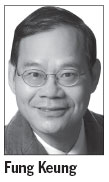Mainland kids shouldn't be discriminated
Updated: 2013-01-25 06:44
By Victor Fung Keung(HK Edition)
|
|||||||

It is wrong to discriminate against children who were born in Hong Kong but whose parents are mainlanders. A government official hinted on Tuesday that primary one places in the northern district of Hong Kong (which borders Shenzhen), including Sheung Shui, Lok Ma Chau and Fanling, may give priority to children who reside locally. This will be a huge mistake if implemented.
We are proud to be Hongkongers, because our city cherishes the values of fairness, justice, rule of law and empathy. The kids born in Hong Kong to mainland parents have the right of abode in the city. They have the right to receive an education in Hong Kong, no matter how annoying that may be to local parents whose children are vying with mainland kids for primary-one places. These youngsters living in Shenzhen and areas close to Hong Kong could sue our government for breaching equal opportunities principles, to say the least.
They could also accuse our government of adopting a discriminatory education policy against them. Whether their parents pay taxes in Hong Kong shouldn't be a factor affecting these kids' education opportunities in this vibrant city.
In recent years, about 200,000 kids were born in Hong Kong to mainland parents, many of whom now live in Shenzhen so that their children can receive a Western-style education in Hong Kong when the kids turn six.
It is estimated that about 1,700 children, including those from Shenzhen, would apply for primary one places in Sheung Shui alone this September, but we have only roughly 700 places available. That means 1,000 children born to parents in Hong Kong or the mainland won't be able to secure a place. That would be very frustrating and disappointing to parents indeed.
The solution is not to give priority to local children to keep their parents happy. (The government may adopt this policy for political expediency. The CY Leung government doesn't need to see angry parents attacking the administration.) The answer is to create enough places to meet the increasing demand. How difficult can that be?
I have lived in Sheung Shui for a long time. I know there are many village-schools (including those in the Kam Tsin and Koo Tong areas) which were closed in recent years due to a declining local birth rate. Why can't the government reopen these empty and deserted village primary schools?
We don't have enough teachers, some may argue. Don't forget, in addition to teachers produced by the Hong Kong Institute of Education, there are about 10,000 students (mostly from the mainland) graduating every year with master's degrees from self-financed courses. Many of these graduates want to work and stay in Hong Kong. Some are qualified, although they lack a teaching certificate, to teach language, math and science subjects in primary schools.
Let us welcome those children born here to mainland parents with open arms. If we stigmatize them as "queue jumpers", their classmates or even some of their bigoted teachers may become abusive towards them. That would make it harder for them to learn, sit still in class and rebound from disappointments, according to the research by Paul Tough, author of a newly released book called "How children succeed: grit, curiosity and the hidden power of character."
Children studying in an abusive environment will become less likely to enter university, Mr Tough's research shows. That would be bad for Hong Kong as these Hong Kong-born mainland children, I am sure, would want to have a good life in Hong Kong, instead of a life of disappointments or even crimes when they grow up. At least that is what their mothers want when they took the risk of coming to Hong Kong to give birth to them so that they have the right of abode here.
Let us work together to provide a good education environment for these mainland Hong Kong-born children. They are part of us. They are our brothers and sisters. As they grow up in a friendly environment, they will contribute to Hong Kong's long-term prosperity. Reopening some deserted village primary schools, albeit costly, is a small price to pay.
The author is a university lecturer. He recently published a liberal studies book entitled "Understanding business news and business news writing in Asia".
(HK Edition 01/25/2013 page3)